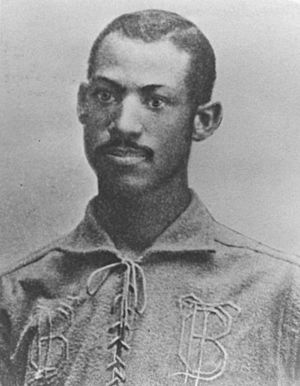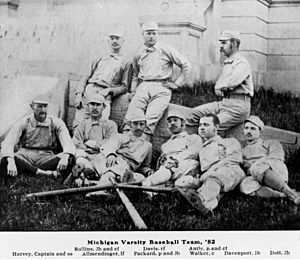Moses Fleetwood Walker facts for kids
Quick facts for kids Moses Fleetwood Walker |
|||
|---|---|---|---|
 |
|||
| Catcher | |||
| Born: October 7, 1856 Mount Pleasant, Ohio, U.S. |
|||
| Died: May 11, 1924 (aged 67) Cleveland, Ohio, U.S. |
|||
|
|||
| debut | |||
| May 1, 1884, for the Toledo Blue Stockings | |||
| Last appearance | |||
| September 4, 1884, for the Toledo Blue Stockings | |||
| MLB statistics | |||
| Games played | 42 | ||
| Batting average | .263 | ||
| Hits | 40 | ||
| Runs scored | 23 | ||
| Teams | |||
|
|||
Moses Fleetwood Walker (October 7, 1856 – May 11, 1924) was an American professional baseball catcher. He is known for being the first black man to play in Major League Baseball (MLB). He was born in Mount Pleasant, Ohio. Walker was a talented athlete at Oberlin College and the University of Michigan. He played for smaller baseball clubs before joining the Toledo Blue Stockings in 1884.
While some research suggests another player, William Edward White, played earlier, Walker was the first to openly identify as black. He faced racial challenges common in the late 1800s. His brother, Weldy, also played for Toledo later that year. Walker played only one season in MLB due to injuries.
After his MLB career, Walker continued to play in the minor leagues until 1889. He was the last African-American player in the major leagues until Jackie Robinson broke the color barrier in 1947. Later in life, Walker became a successful businessman and inventor. He also wrote a book called Our Home Colony (1908). This book explored his ideas about African-Americans moving back to Africa. He passed away in 1924 at age 67.
Contents
Moses Walker's Early Life
Growing Up in Ohio
Moses Fleetwood Walker was born in 1856 in Mount Pleasant, Ohio. This town was a safe place for runaway slaves since 1815. It had a large Quaker community and former slaves from Virginia. Walker's parents, Moses W. Walker and Caroline O' Harra, were both of mixed race.
When Moses was three, his family moved to Steubenville, Ohio. His father became one of the first black doctors in Ohio. He later became a minister. Moses and his younger brother, Weldy, went to Steubenville High School. This was when the community started allowing all races to attend school together.
College and Baseball Beginnings
In 1878, Walker started at Oberlin College. He studied philosophy and the arts. He was a very good student, especially in mechanics and public speaking. It's not clear how he started playing baseball. However, he became the catcher and leadoff hitter for Oberlin's prep team.
Oberlin College had baseball teams as early as 1865. Walker became a star player. The school newspaper, The Oberlin Review, praised his skills. They noted his great ball-handling and ability to hit long home runs.
In 1881, Oberlin allowed its teams to play against other colleges. Walker and his brother Weldy played on Oberlin's first inter-collegiate team. A pitcher from Oberlin said that Walker's playing convinced the University of Michigan to recruit him. Walker then transferred to Michigan.

At Michigan, Walker helped the baseball team a lot. They finished with a good record of 10 wins and 3 losses in 1882. He usually batted second in the lineup. He had a batting average of .308.
While at Michigan, Walker also played for a semi-professional team in Cleveland. This team was paid by the White Sewing Machine Company. In August 1881, his presence caused problems in Louisville, Kentucky. Walker was not allowed to stay at the team's hotel because he was black. During the game, the opposing team refused to play if Walker was in the lineup. Cleveland eventually agreed to keep him out. But when his replacement got hurt, Walker had to play.
Moses Walker's Baseball Career
Joining the Professional Leagues
In 1883, Walker left Michigan and signed his first professional baseball contract. He joined the Toledo Blue Stockings, a team in the Northwestern League. The team's manager, William Voltz, had seen Walker play in college.
Walker became known for his excellent catching skills. He was very tough, especially since catchers back then wore little to no protective gear. He played in 60 of Toledo's 84 games that season. The Blue Stockings won their league championship. One sportswriter called Walker and pitcher Hank O'Day "one of the most remarkable batteries in the country."
Facing Challenges in Baseball
Walker's entry into professional baseball caused immediate issues. Before he even played a game, some teams in the Northwestern League tried to ban all black players. After strong arguments, the ban was dropped, and Walker was allowed to play.
On August 10, 1883, the Blue Stockings played an exhibition game against the Chicago White Stockings. Chicago's manager, Cap Anson, refused to play if Walker was in the lineup. Toledo's manager, Charlie Morton, stood up to Anson. He warned Anson that his team would lose money if they didn't play. Morton also started Walker in right field. The White Stockings still won the game.
Playing in Major League Baseball
Because the Blue Stockings had a great season, they moved up to the American Association in 1884. This was a major league.
Walker's first major league game was on May 1, 1884. He played against the Louisville Eclipse. He didn't get any hits and made four errors in a 5–1 loss. Throughout the 1884 season, Walker often caught for star pitcher Tony Mullane. Mullane said Walker was "the best catcher I ever worked with."
Walker's year was difficult due to injuries. He played in only 42 games out of 104. He had a .263 batting average, which was one of the best on the team. His brother, Weldy, also played six games for the Blue Stockings that season.
The Toledo team faced money problems at the end of the season. Walker was released by the Blue Stockings on September 22, 1884. He was still recovering from a rib injury.
After the Major Leagues
Walker returned to baseball in 1885, playing in the Western League. He also played for a team in Waterbury. After the season, he and Weldy bought a hotel and opera theater in Cleveland.
Walker returned to Waterbury in 1886. The team joined the more competitive Eastern League. In 1887, Walker joined the Newark Little Giants. He and pitcher George Stovey formed the first African-American "battery" (catcher and pitcher) in organized baseball. Fans called them the "Spanish battery." Stovey won 35 games that season. Walker had career highs in games played, fielding percentage, and batting average.
Walker then played for the Syracuse Stars in 1888. He was very popular with fans in Syracuse. On August 23, 1889, Walker was released from the team. He was the last African-American to play in the International League until Jackie Robinson.
Moses Walker's Later Life
Inventions and Business
After leaving baseball, Walker stayed in Syracuse. He worked for the postal service. He also became an inventor. In 1891, he patented a design for an artillery shell. This was the first of his four inventions. He hoped it would be very popular, but it didn't get much interest.
Later, Walker and his brother Weldy owned a hotel in Steubenville. He also managed the Opera House, a movie theater in Cadiz. He became a respected businessman. He patented inventions that improved film reels as movie theaters became popular.
Writing and Advocacy
In 1902, the brothers started editing a newspaper called The Equator. They explored ideas about black nationalism. Walker expanded on his ideas in a book called Our Home Colony (1908). This book talked about the challenges faced by black people. It also suggested that African-Americans should move back to Africa. People called it "the most learned book a professional athlete ever wrote."
Moses Fleetwood Walker passed away on May 11, 1924, at the age of 67. He was buried next to his first wife.
Moses Walker's Legacy
For many years, baseball fans knew Moses Fleetwood Walker as the first African-American to play in Major League Baseball. While Jackie Robinson is often given this credit, Walker held the honor for decades before him.
In 2007, a researcher found that another player, William Edward White, who was formerly enslaved, played one game about five years before Walker. However, baseball historians still credit Walker as the first to openly play as a black man in the major leagues. White had lived his life as a white man. Like Robinson, Walker faced racism and challenges in the major leagues. He was the first black man to do so.
Walker was honored by being inducted into the Oberlin College Hall of Fame in 1990. In 2021, a musician named Cousin Wolf released a song about him.
Images for kids
See also
 In Spanish: Moses Fleetwood Walker para niños
In Spanish: Moses Fleetwood Walker para niños
 | Chris Smalls |
 | Fred Hampton |
 | Ralph Abernathy |


